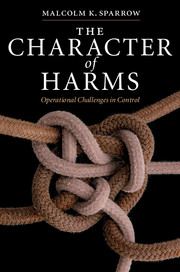Part II - Special categories of harms
Published online by Cambridge University Press: 06 July 2010
Summary
Harms can be grouped together in several ways, and for rather different purposes.
The most familiar groupings bring harms together if they belong to the same general field, which might be highway safety, tax compliance, environmental protection, or infectious disease control. Grouped this way, harms are likely to fall within the same area of professional responsibility, and the task of controlling them draws upon the same body of technical or scientific knowledge. On this basis it makes sense to group together crime problems (the domain of criminologists and law enforcement; infectious diseases (the domain of public health experts, and medicine), occupational safety hazards (structural engineering, industrial hygiene, and toxicology). Similarly with tax non-compliance problems, transportation hazards, threats to financial markets, and so on. In each area we would expect to find experts who have mastered the relevant underlying disciplines, and who keep themselves current with respect to emerging and evolving threats within their field. Specialization along these lines bolsters the knowledge bases and scientific disciplines upon which effective control depends. It is also efficient in the sense that an expert in one domain does not need to know much about all the other domains, assuming that the groupings by professional area align reasonably well with relevant underlying disciplines.
- Type
- Chapter
- Information
- The Character of HarmsOperational Challenges in Control, pp. 169 - 180Publisher: Cambridge University PressPrint publication year: 2008



